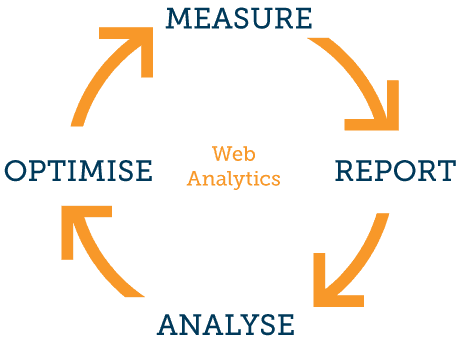Data, data, data.
Your business, no matter what it is, should be driven by data. Quite simply it allows you to make fact based decisions, essential to running your operations as effectively as possible. You can plan future efforts based on your results of the past be it doing something because you have been successful or avoiding actions because you know they failed previously.
How do you get this data and act upon, and how do you know what data is relevant to you? Based on the fact that you are probably browsing this website for hints and tips about Social Media, web analytics or digital marketing then I am going to assume that you have some sort of web presence whether your own an eCommerce site, blog or Social Media accounts.
As I have already written a bit on Social Media (and more to come) I will highlight website “analytics”, the data you can get, the tools you can use and useful insights into data that should matter to you (and your business).
Aim
Everything in life has a purpose with the exception of the iPad Mini perhaps, so if you have a web site you will have a goal. It might be that you just want to be informative and get a kick out of helping others. You may be selling a product and want to drive people to buy it. If your site is a business site then the aim is to achieve business goals – whatever they may be.
Questions to Ask
To help you achieve the goals of your site you should try to get the answers to these simple questions:
- What did they do?
- Why did they do it?
How to Answer
“… did they do …” will undoubtedly vary depending on your website but keeping this article on a really simple level for now, you will need some analytics tool to capture information on visitors to your site. There are literally hundreds of options here: from built-in analytics by blog platforms such as WordPress; to free tools such as Google Analytics; to Enterprise solutions such as Adobe SiteCatalyst. The depth of data you can get back depends on the tools and the implementation but it’s up to you to decide what is important for your site/business.
A standard implementation of tracking code on your web site should give you basic insights to answer the questions, I’ve broken them down with a few examples:
Simple metrics for “what”
What were visitors doing on your site?
- page views, number of pages, time spent, comments, shares, exits
This gives an indication of the pages that people looked at, what did they do while on site and when did they leave. You can see how long they spent on your site, if they were there for just one article or they found the pages engaging enough to look at other content too.
Simple metrics for “why”
Your site has a purpose, but why did they pay it a visit?
- referral information, keywords, pages, entries
Indicative of how the users got to the site and what they wanted to see. Referrals means the site seen before the visit to your site. This could be search engines, social media, tech articles or blogs. If you tie this with potential keywords, if applicable, and the page names of your content, you can see what they were looking for.
Other metrics that are useful are the amount of visitors you had, whether they are new visitors or have been to your site before. Using this information gives you an idea of what your audience actually is and whether your content is successful or not. You can combine many metrics to get very good overview of your sites performance even without fancy tracking capabilities. You can define your Key Performance Indicators from this information, create a simple dashboard for quick reference and act on these results to improve your site accordingly.




